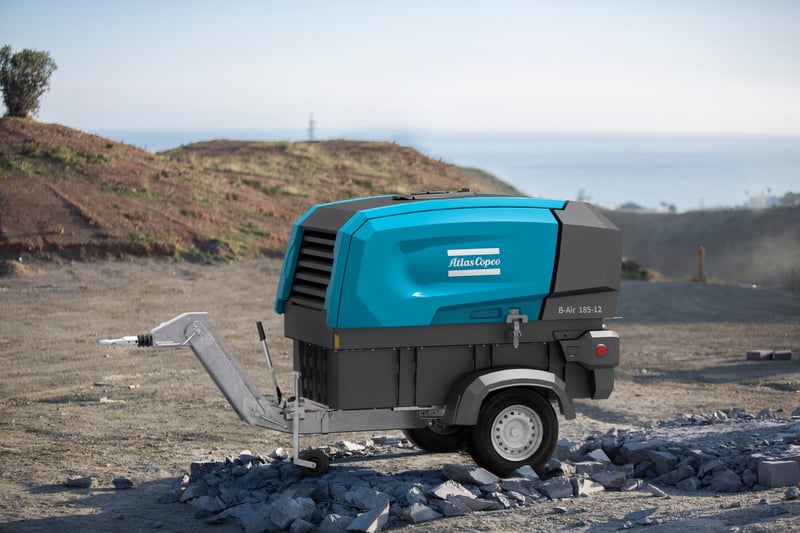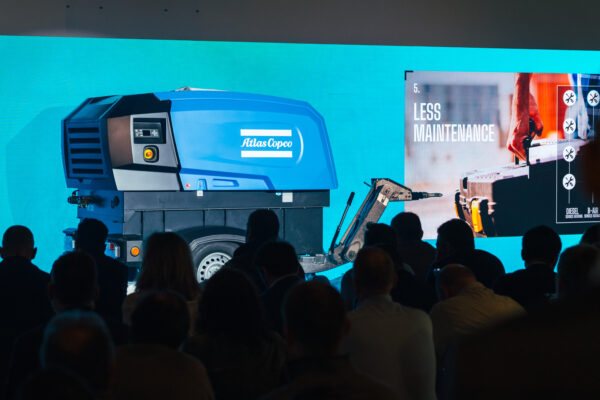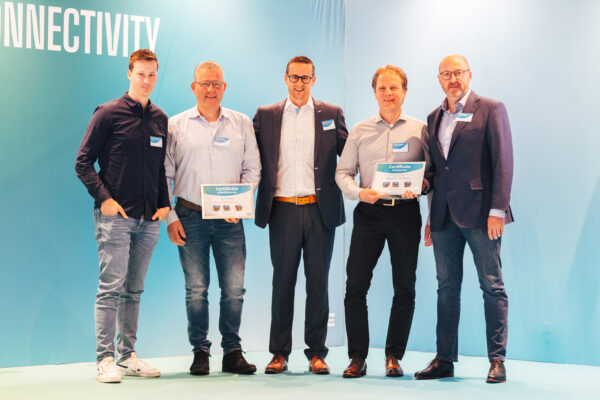 Electric mobile compressor with Variable Speed Drive
Electric mobile compressor with Variable Speed Drive Atlas Copco unveils its first battery-driven portable screw compressor
Unveiling its all-new battery-driven portable screw air compressor, Atlas Copco’s ‘B-Air’ marks a defining moment in the global industrial marketplace’s transformation towards a low-carbon future.
In the latest sign of its progressive shift to more sustainable products, Atlas Copco has expanded its portable electric product portfolio to include an all-new battery-driven portable screw air compressor. The B-Air 185-12 is the first of its kind within the global industrial marketplace and represents a major milestone in Atlas Copco’s roadmap toward a sustainable future.
“We are committed to accelerating the transition away from carbon-dependency and towards renewable energy sources,” explains Maarten Vermeiren, Product Marketing Manager of Sustainability and Digitalization at Atlas Copco, Portable Air Division. “By introducing the first battery portable screw compressor, we want to play our part in enabling a sustainable transformation and help build a better tomorrow – for society and the planet alike.”
Clean power
The B-Air 185-12 features a 5-12 bar of pressure, a stable flow rate of 5.4-3.7 m3/min, and a 55-kWh battery storage capacity. With power delivered from its onboard power pack, in operation a fully charged unit is independent of the need for fuel or a local power source to plug into, and has the capability to perform for up to a full typical work shift In turn, it provides both portability and productivity for those working on sites where regular access to electricity is not practical.
Making the switch from an internal combustion engine (ICE) to an electric motor brings with it a host of benefits, including less downtime and maintenance requirements. Due to having far fewer moving (and therefore wearing) parts compared to a diesel-powered unit, the electric B-Air 185-12 only needs to be serviced every 2,000 hours, as opposed to 500 hours for a typical ICE-powered unit. The machine’s state-of-the-art Variable Speed Drive (VSD) and permanent magnet motor drive down the total cost of ownership, automatically adjusting the motor speed to match air demand in real-time and increasing energy efficiency by up to 70%.
Through Atlas Copco’s rigorous testing process, which includes rapid aging testing under harsh conditions and climactic chamber testing, the B-Air 185-12 has been proven to perform optimally even in the most extreme of climatic conditions – ranging from +45°C (+113°F) to a glacial -25°C (-13°F); and 4,500 meters (14,764 ft) above sea level. The unit is also designed to excel in densely populated urban areas where emission and noise pollution are tightly restricted, thanks to it producing no local emissions and having low noise levels. The quiet nature of the compressor enables operators to work without noise distraction, enhancing both productivity and safety.

The B-Air during its reveal at the ‘Journey to a Sustainable Future’ Event
Building a better tomorrow
The B-Air 185-12 was first unveiled at the recent Atlas Copco’s ‘Journey to a Sustainable Future’ event in Antwerp, Belgium. Here, the company gathered senior business leaders from across the industry to discuss how best to tackle the transformation to a climate-friendly, low-carbon future. The new battery-powered unit marks a vital step in the electrification of Atlas Copco’s product offering and is just one of many developments the company currently has in store to deliver sustainable solutions to its customers. The unit came to life thanks to the long-term partnership with Perslucht Wilda, Atlas Copco’s distributor in The Netherlands for more than 40 years. During the event, it was also announced that Dutch infrastructure company Van Doorn made history by purchasing the first B-Air unit.

Representatives from Van Doorn, Atlas Copco, and Perslucht Wilda
Bert Derom, President of Atlas Copco Portable Air Division, comments:
“Atlas Copco is proud to be committed to our industry’s fight against climate change by developing the first battery-driven screw compressor. The B-Air 185-12 is a tangible symbol of our commitment to delivering real-world solutions to help our customers and their customers adopt a more sustainable way of working and to turn the tide on climate change. We ultimately want to offer a sustainable alternative to every user and every application, and this new battery-powered unit is a leap closer to that goal.”
The B-Air 185-12 is scheduled to go into production in September, using a compact and modular concept with multiple autonomy variants.









